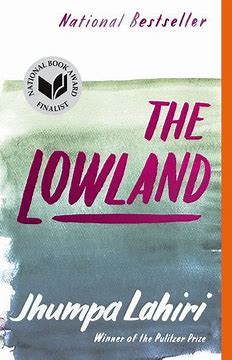“In a world of diminishing mystery, the unknown persists” (Jhumpa Lahiri, The Lowland)
This quote exemplifies the overarching themes of The Lowland, a historical and realistic fiction novel written by Jhumpa Lahiri that is set in the times of the Naxalite movement in India. It is a story that acts as a testament to her familiar style and is immersed not only with stories of foreigners who find their footings in new worlds, but women who wish to untangle tradition from their diasporas, and children who prefer to live as nomads with no contact to their familial foundations.
Summary:
The story follows two brothers, Subhash and Udayan. Subhash, the story’s main protagonist, is shy and overly responsible, often lying in his brother’s shadow who, in contrast, is bright, politically active, and outspoken. Udayan becomes heavily involved in India’s 1967 Naxalite movement, trying to eradicate his country’s poverty. But, due to Udayan’s unrelenting spirit to fight for what he believes in during an extremely conservative time in India, he is executed by police officers, his body stolen and never returned. Subhash, who has since moved to Rhode Island to study engineering, decides to marry Gauri, Udayan’s pregnant wife, father her child, and move her to America. The novel eventually turns into a generation-trapising saga that illustrates Lahiri’s mastery of changing perspectives, as the novel often shifts between Subhash, Gauri, and their child, Bela. It is full of unique patterns and a distinct personality that made the book an enjoyable read.
Review:
As someone who is familiar with Lahiri’s writing style, I believe that it was exemplified in this novel. Her detailed descriptions, subtle morality, and complex characters are capitalized on throughout The Lowland.
Speaking of the characters, they were all extremely developed. Something interesting about this novel in particular is that Lahiri not only created their strengths and the love they had for one another, but she also emphasized their flaws, what they were scared of, who they eventually became.
There are multiple different themes throughout the book, but I think one that spoke out to me a lot was the complexity of love and how it is ever-changing, yet a constant all at once. Lahiri conveys the message that, no matter how dire a situation may be, true affection can prevail over hardship, unceasing through time.
There were some very interesting stylistic choices made throughout The Lowland. For example, Lahiri doesn’t use quotation marks throughout the novel at all, so one never knows when a character is speaking. The plot was very heavy and elaborate, and there were multiple things happening at once, which made for an interesting read.
The Lowland is probably my favorite novel of Lahiri’s. It’s deeply philosophical and really eye-opening to watch the characters go through their lives, make their own mistakes, but also be able to see how much those decisions affect those around them, those that they are oblivious to. But, I found the lack of quotation marks confusing as the book went on, and the overload of different stories and plots made the book a little hard to follow. The Naxalite Movement could’ve been touched on a little more to make it easier to understand for the reader.
Overall, The Lowland was a great book. I’d recommend it to anyone interested in historical fiction, novels surrounding familial relationships, or anyone who wants to try out a classic 21st century author. If you are just getting started reading Lahiri’s books, I would start out with The Namesake and then read The Lowland.
I would give this book: 📚📚📚📚- a captivating, thought-provoking read! (4/5)
Happy Reading!
Love, Nidhi

